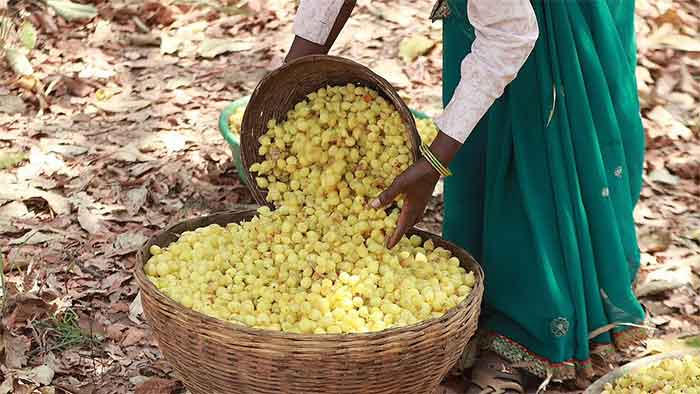
The happiness of 65-year-old Santo Bai, an Adivasi in Madhya Pradesh, knows no bounds. After suffering during the Covid pandemic she is now bursting with happiness because the Mahua flower, used for making a popular, traditional brew is blooming well in the forests this time.
She goes to the forest to collect Mahua flowers every morning and returns home in the afternoon. So far she has collected one and a half quintals of Mahua flowers. One quintal has already been sold, enabling her to buy cooking oil and ration for the home for Rs 3500. After a gap of three years later, she has also been able to purchase a traditional cloth, called Lugda in the tribal community, worth two hundred and fifty rupees.
“Covid had ruined everything. The future appeared dark as there was no source of income. There was no work in the village and even if it was available, we have become too old for physical labour. We had to struggle for every single rupee. In such a situation, the Mahua flower harvest has come well on time. I am collecting Mahua every day. Hopefully I will collect 4-5 quintals of Mahua in the next one month” says Santo.
 Rajkumar Sinha, who opposes the government’s policies of repeated displacement of Adivasi populations through various big development projects, says that this time Mahua flower has bloomed well in many districts including Mandla, Shahdol, Umaria, Balaghat, Seoni and Chhindwara. The reason for this he says is that the weather remained dry and there was no unseasonal rain
Rajkumar Sinha, who opposes the government’s policies of repeated displacement of Adivasi populations through various big development projects, says that this time Mahua flower has bloomed well in many districts including Mandla, Shahdol, Umaria, Balaghat, Seoni and Chhindwara. The reason for this he says is that the weather remained dry and there was no unseasonal rain
Santo Bai is a resident of Chikhlar village. This village is situated about 200 km away from Bhopal, the capital of MP and 125 km from the Maharashtra border. This village is situated by the forest which are full of Mahua trees. According to an estimate, 21 percent of the population in MP is from the Adivasi communities and 75 percent of them are still dependent on forest produce for their income.
Santo Bai hesitates a bit and then tells us that there would have been even more benefits, but the traders are taking advantage of their desperate condition and buying the Mahua from them at throwaway prices. They will sell the flowers after the monsoon for double the money and make a big profit. Although both the governments have fixed its support price which is Rs 35 Adivasi communities describe this price as low.
“I can also sell Mahua after the rain but I am in dire need of money right now. There is no way to store the Mahua safely as there is not enough space in the house. Traders are taking advantage of this’ she says.
This pain is not of Santo Bai alone or of Adivasis from Madhya Pradesh alone. In neighbouring states like Chhattisgarh and Jharkhand where Mahua trees are found in the forest and people collect them to earn their living the collected flowers are being sold to the traders at t30 to 35 rupees per kg. The same Mahua will be sold after the rains for Rs 60 to 70 per piece.
Sambal, a resident of Damjipura village, sighs and says angrily that the hoarders who buy Mahua flowers are robbing the Adivasis. With so much effort, Mahua is selected and brought and they buy it at low rates and earn twice as much. Our government doesn’t care, he says.
Successive governments in MP have claimed to be making efforts to connect the people of the tribal community with the mainstream markets by making a heritage drink from Mahua flowers and marketing it widely. After the Tribal Cooperative Marketing Development Federation of India (TRIFED) set up plants for commercial production of Mahua heritage drink at Jagdalpur in Chhattisgarh and Taluja in Raigad district of Maharashtra, claims were made to set up similar plants in MP also . However, the dreams of mass production of the heritage drink and selling it with other beverages in the current market competition did not materialise.
Navsangat and Bhima Singh of Korba district of Chhattisgarh say that due to Covid, the inflow of money stopped, because no work was available. There is no other means of income. In the intervening years, even the Mahua flowers did not bloom properly. Many villagers did not get their children married because there was no money to meet the expenses. This year though, each family has collected five to six quintals of Mahua flowers and now their children can get married as their financial situation improves.
According to them after several years of poor harvests the Mahua produce is good this year and this will help alleviate the poverty of many Adivasi villagers. Mahua is a species of trees whose small flowers fall to the ground and are gathered by Adivasi communities to make a medicinal drink that is also mildly intoxicating and fetches a good price.
Rama Kakodia, an expert on tribal affairs who has fought for the rights of tribals in MP for long, says that Mahua flower is helping to bring out Adivasi communities from the distress caused by the impact of the Covid pandemic. Had hoarding of the flowers by traders been stopped and the government increased the support price, it would have been more beneficial.
Pooja Yadav is a journalist based in Bhopal, Madhya Pradesh.













































